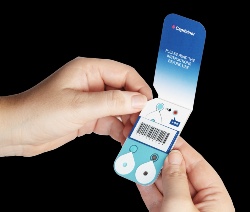In the years since the emergence of COVID-19, scientists have learned a lot about how the infection works and some of its long-term effects on various systems in the body. A lot of research so far has focused on the effects of severe cases of the disease. What’s less clear are the long-term physiological effects of infections on people with mild symptoms or who were asymptomatic. Scientists from KTH Royal Institute of Technology and other institutions in Sweden aimed to shed some light on this question by analyzing antibodies in dried blood samples from the general population collected using at-home kits.
In a new paper published in Communications Medicine titled, “Proteome profiling of home-sampled dried blood spots reveals proteins of SARS-CoV-2 infections,” the authors explained how they used deep proteome profiling of home-sampled dried blood spots (DBS) to assess the effects of SARS-CoV-2 in mildly symptomatic or asymptomatic individuals in urban areas in Sweden. “In clinical plasma and serum samples, in-depth proteomic analysis has already delivered valuable insights into the pathology and pathogenesis of COVID-19,” the researchers wrote. “Our DBS study aimed to demonstrate the utility of self-sampling and identify circulating proteins associated with SARS-CoV-2 infections by considering the serological phenotypes.”
While this study focuses on COVID-19, Jochen Schwenk, PhD, a professor of translational proteomics, chair of HUPO’s Human Plasma Proteome Project, and senior author on the paper, noted that the methodology could apply to other conditions that require large population studies to assess the various genetic, phenotypic, and environmental factors involved in diseases development and treatment response.

The kits are developed by Swedish medtech company Capitainer. The company’s qDBS system, which was used for the study, features a capillary system mounted on a card for capturing blood from finger pricks. It includes a smart chip that ensures that patients capture precise volumes of blood—10 microliters—as well as a colored indicator that lets them know that their sample has been successfully captured. Kits also come with instructions for safely and sterilely collecting blood samples. The same kit was used in Harvard University’s VIVID study, which aimed to determine the effects of vitamin D supplementation on COVID-19 disease progression and post-exposure prophylaxis.

According to the paper, the scientists conducted three studies with a subset of the samples they received and patients were assigned to studies based on their serostatus and self-reported information. “We compared seropositive with seronegative subjects (study 1) and donors classified into the early or post-infection phases (study 2) from the first wave of the pandemic,” they wrote. “We also studied seropositive and seronegative subjects from the third wave of the pandemic who were not vaccinated at sampling (study 3).”
Participants in the first two studies came from the first round of tests sent out in spring 2020 while those in the third study came from the second batch of tests. In total, the team looked at data from 228 individuals for the studies.
They tested the samples for over 250 blood proteins associated with cardiovascular disease and metabolism using proximity extension assays developed by Olink Proteomics. Blood samples collected from seropositive and seronegative people early on in the pandemic revealed various proteins involved in immunity, inflammation, coagulation, and stress response, according to the results. The data also showed that blood samples collected later in the pandemic had differing levels of a virus receptor on B cells.
Schwenk and his team will apply lessons learned from this initial study including some of the best practices they picked up for treating samples and data in future studies. They are also optimistic about the feasibility of conducting studies like this one in other disease areas. For example, a similar approach could be used to collect data from patients with seasonal allergies perhaps before and after they have received a particular intervention or treatment or to assess changes in inflammation proteins in response to allergens, he said.
Furthermore, because the infrastructure requirements for this kind of testing are relatively minimal compared to traditional blood testing, a methodology like this could also be applied to study diseases in resource-limited regions or in populations in hard-to-reach geographic locations.



